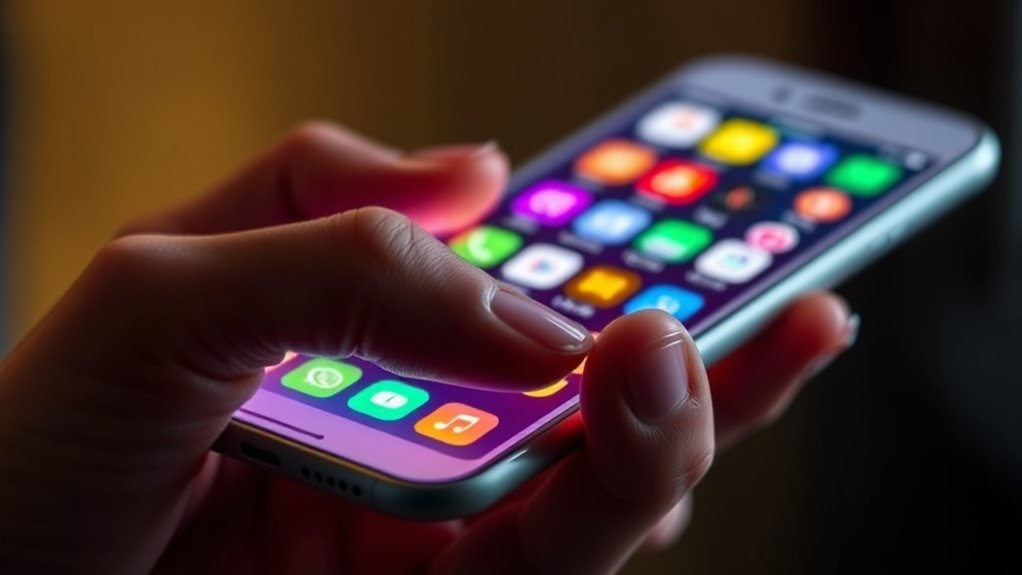Notifications hijack your focus by triggering quick dopamine releases that make you want to check your device repeatedly. Each alert acts as a reward, reinforcing the habit of distraction and making it harder to concentrate on important tasks. Over time, your brain becomes accustomed to these tiny hits, diminishing your attention span and patience. If you want to learn how these behaviors develop and how to reclaim your focus, there’s more to discover.
Key Takeaways
- Notifications activate the brain’s reward system, releasing dopamine and reinforcing habitual checking behaviors.
- The dopamine hits from alerts create a cycle of distraction, making it hard to sustain deep focus.
- Frequent interruptions fragment attention, reducing mental stamina and impairing critical thinking.
- Neural pathways adapt to constant alerts, increasing sensitivity and triggering frustration when access is restricted.
- Turning off non-essential notifications helps reset attention and restores mental clarity.

In today’s fast-paced digital world, notifications constantly pull your attention away, making it harder to stay focused on what truly matters. Every ping, buzz, or pop-up triggers a dopamine response in your brain, giving you a fleeting sense of pleasure. That quick hit of dopamine is what keeps you hooked, craving more notifications and interrupting your flow. Over time, this constant stimulation wears down your attention span, making it harder to concentrate on tasks for extended periods. Instead of deep focus, you’re caught in a cycle of brief, fragmented moments where your mind jumps from one distraction to another.
Notifications hijack your focus, triggering dopamine hits that fragment your attention and disrupt deep concentration.
When a notification appears, your brain perceives it as a potential reward, activating the reward pathway that releases dopamine. This chemical surge reinforces the behavior of checking your device, creating a habit that’s hard to break. The more often you respond to notifications, the more your brain expects that quick dopamine hit, which constantly reinforces the cycle of distraction. As a result, your attention span diminishes, because your brain becomes accustomed to rapid shifts in focus rather than sustained concentration. Tasks that once required hours of deep thinking now seem formidable, as your mental stamina has been compromised by frequent interruptions. Understanding the role of neural pathways in shaping your responses can help you develop better strategies to manage distractions.
The problem isn’t just the distraction itself but how it rewires your brain’s response to stimuli. Your neural pathways adapt to the constant influx of notifications, making it increasingly difficult to resist the urge to check your device. This heightened sensitivity to notifications means you’re more likely to experience frustration or anxiety when you can’t access your phone or ignore alerts. Over time, your ability to sustain attention on tasks diminishes, and you may find yourself feeling more restless or impatient. This effect is especially damaging when you’re trying to work or learn, as your brain’s reward system craves those quick dopamine hits, undermining your capacity for deep focus and critical thinking.
To regain control, you need to understand how your brain responds to notifications and actively work to reset your attention span. Turning off non-essential alerts, creating focused work periods, and practicing mindfulness can help reduce the dopamine-driven urge to check your devices constantly. Recognizing that notifications hijack your brain’s reward system is the first step toward reclaiming your mental clarity. By minimizing these interruptions, you give your mind the space it needs to rebuild its capacity for sustained attention, allowing you to concentrate more effectively on what truly matters.
Frequently Asked Questions
How Do Notifications Affect Long-Term Mental Health?
Notifications can negatively impact your long-term mental health by increasing stress and reducing emotional resilience. Constant interruptions make it hard to focus and relax, leading to anxiety over time. To protect yourself, consider a digital detox regularly, giving your mind a break from screens. Building emotional resilience helps you handle these distractions better, preventing long-term mental health issues and fostering a healthier relationship with technology.
Can Disabling Notifications Improve Productivity?
Disabling notifications can markedly improve your productivity by enhancing your focus. When you practice notification management, you reduce constant interruptions, allowing you to concentrate on tasks without distraction. This focus enhancement helps you complete work more efficiently and with better quality. By turning off unnecessary alerts, you regain control over your attention, making it easier to stay engaged and accomplish your goals without the mental clutter that notifications often cause.
What Psychological Mechanisms Make Notifications Addictive?
Notifications trigger your brain’s reward pathways by providing quick dopamine hits, making you feel momentary pleasure. This reinforcement encourages habit formation, as your brain starts associating notifications with positive feelings. Over time, you become conditioned to check them repeatedly, creating a cycle of addiction. The anticipation of a reward keeps you hooked, making it difficult to resist the urge to check your device constantly.
Are Some Individuals More Vulnerable to Notification Distraction?
Yes, some individuals are more vulnerable to notification distractions due to attention sensitivity and impulsivity traits. If you have high attention sensitivity, notifications easily grab your focus, making it harder to concentrate. Similarly, if you tend to be impulsive, you might struggle to resist the urge to check notifications immediately. Recognizing these traits can help you develop strategies to minimize distraction and regain control over your attention.
How Can Users Regain Control Over Notification Interruptions?
Think of notification management as steering a ship through stormy seas; you control the helm. To regain control, start with mindfulness practices that boost your awareness of distractions. Turn off non-essential notifications and set specific times for checking alerts. This way, you’re less reactive and more intentional, much like a captain maneuvering calmly through chaos, ensuring your focus stays steady and undisturbed.
Conclusion
Every time a notification pops up, your focus gets disrupted—you lose about 23 minutes of productivity on average. That’s nearly a quarter of an hour down the drain, just because of a tiny alert. So, next time your phone buzzes, remember how easily your attention can be hijacked. Turning off non-essential notifications can help you regain control, stay focused, and protect your mental clarity. Don’t let distractions rule your day—take back your focus.









